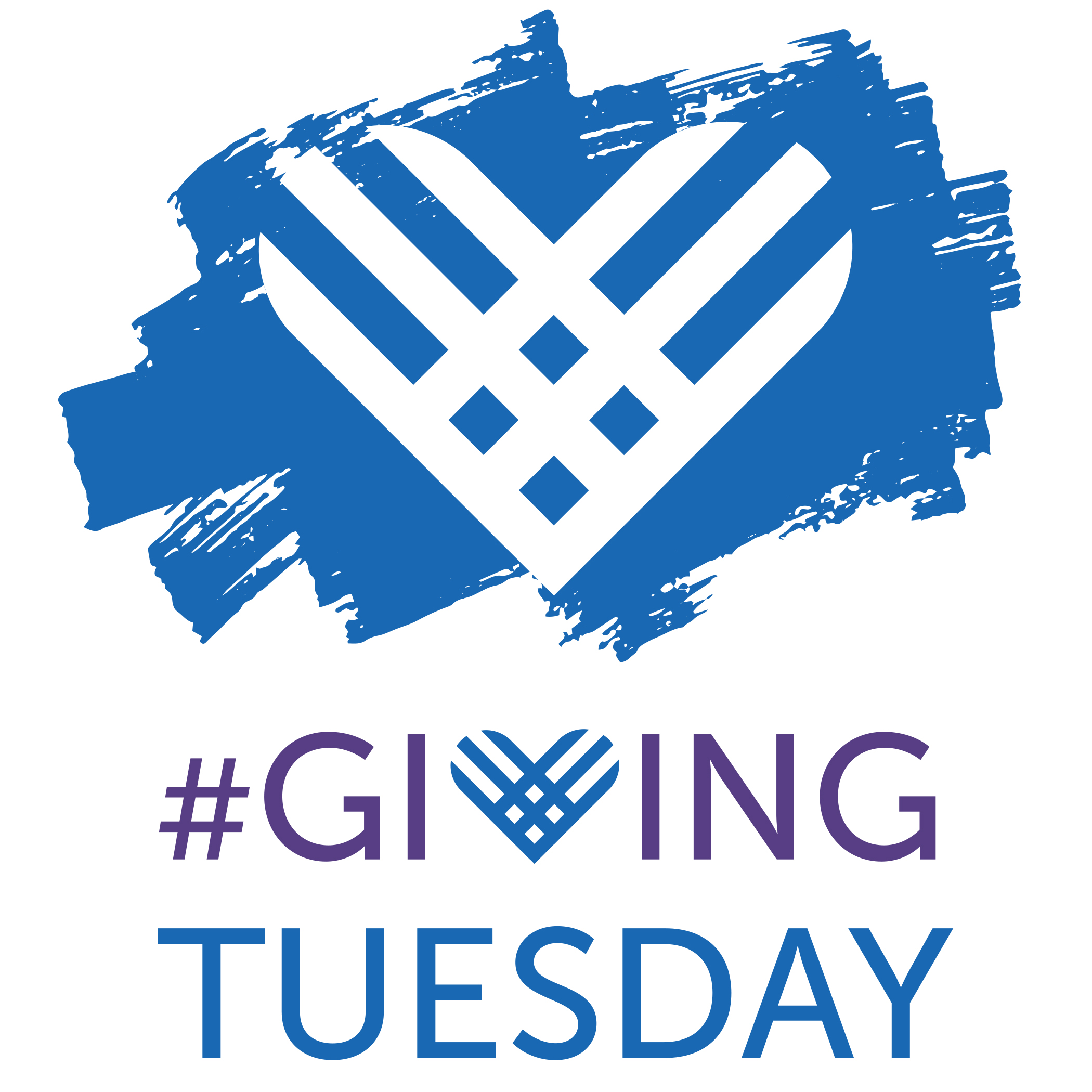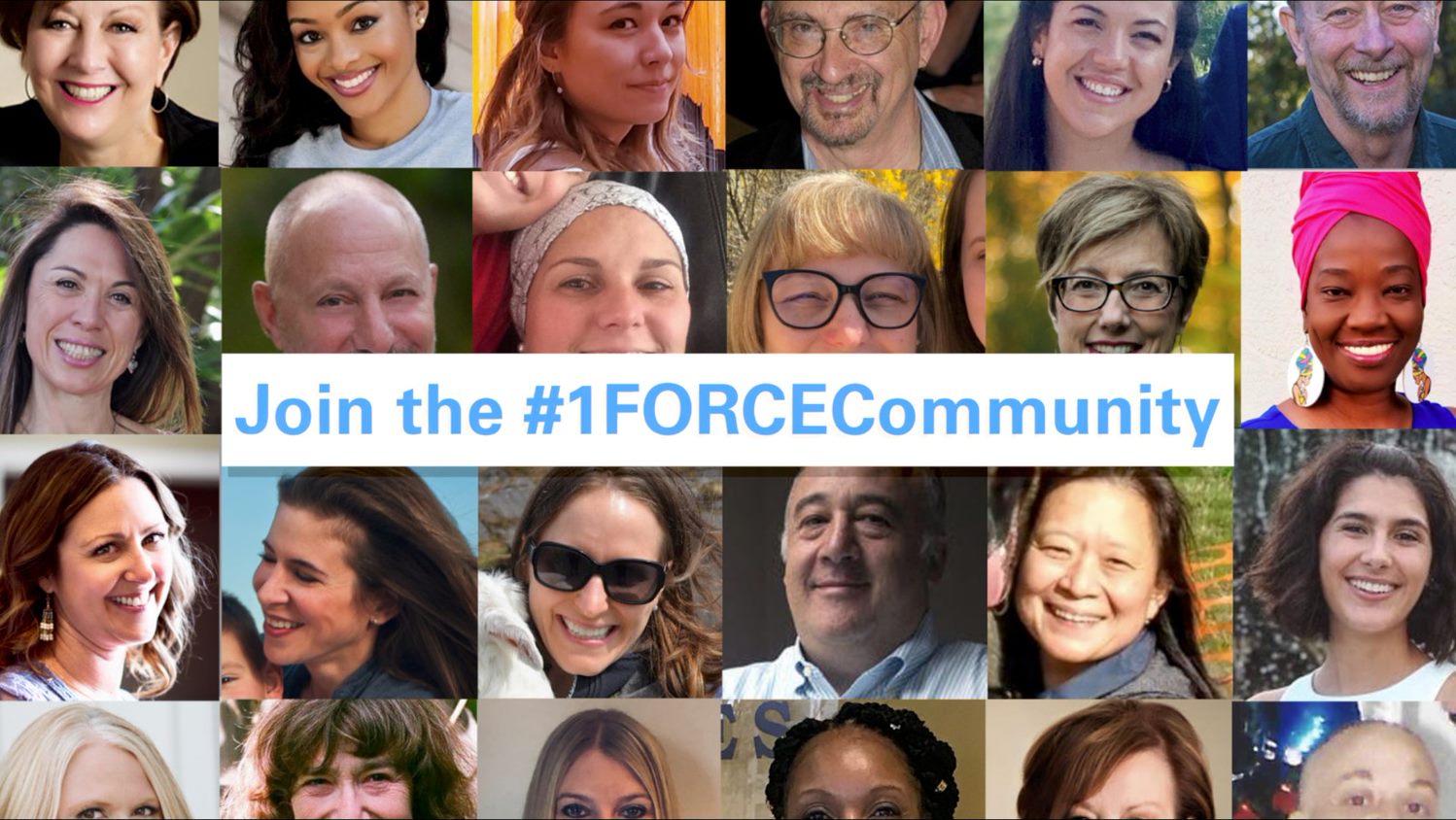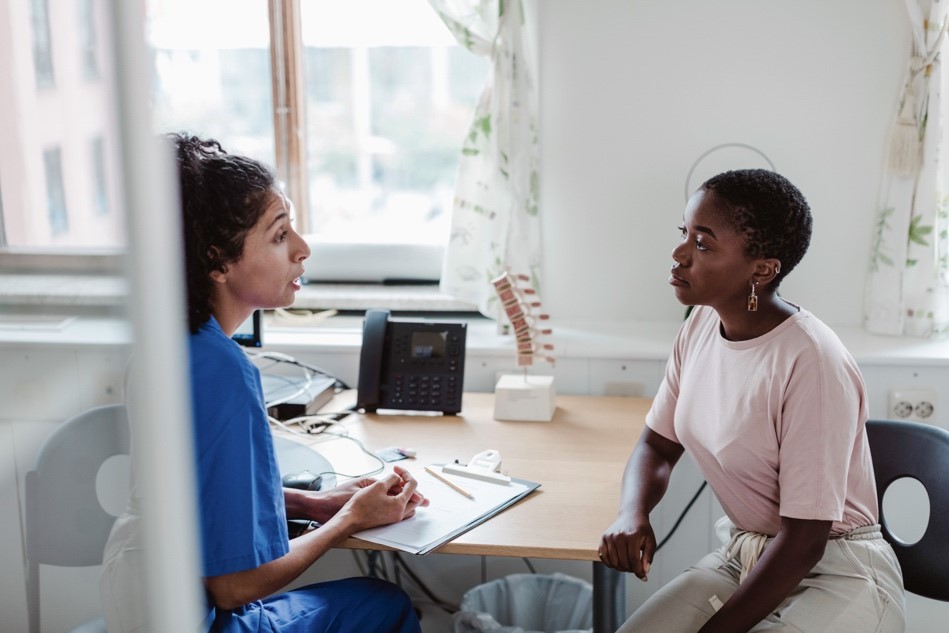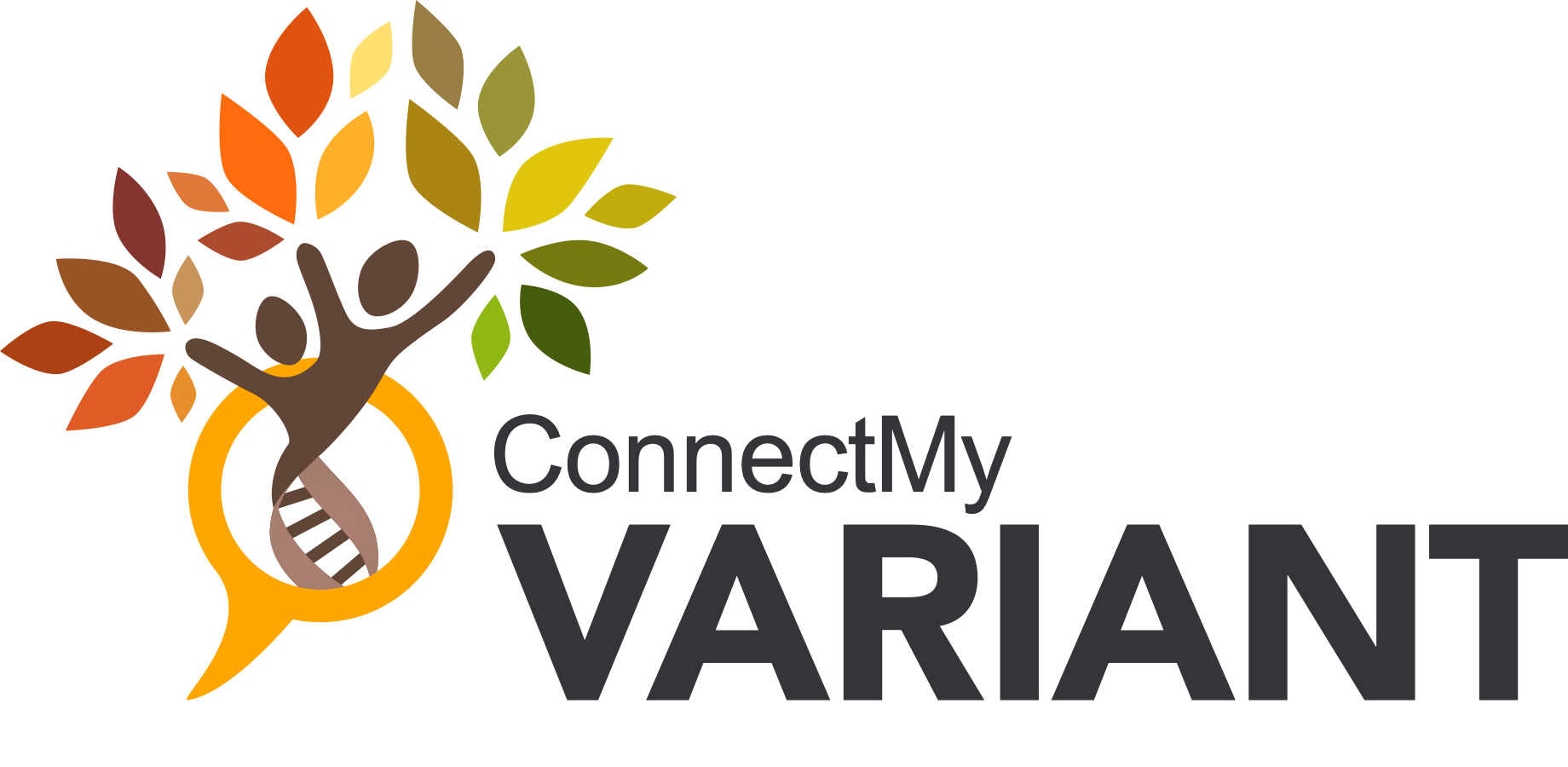| Get Support Donate Get Involved Attend Local Event |

|
Double your impact today!  #GivingTuesday is a global day of generosity created in 2012 as a day that encourages people “to do good,” an opportunity for people around the world to stand together in unity—to use their individual power of generosity to remain connected and heal. We invite you to stand with us today and improve the lives of those facing hereditary cancer by making a gift to FORCE. Thanks to the 2020 Multiplier Fund, YOUR GIFT WILL BE DOUBLED! #GivingTuesday is a global day of generosity created in 2012 as a day that encourages people “to do good,” an opportunity for people around the world to stand together in unity—to use their individual power of generosity to remain connected and heal. We invite you to stand with us today and improve the lives of those facing hereditary cancer by making a gift to FORCE. Thanks to the 2020 Multiplier Fund, YOUR GIFT WILL BE DOUBLED!
Give hope TODAY
|
Meet the #1FORCE Community  FORCE is proud of our new, expanded mission to improve the lives of all those facing hereditary breast, colorectal, endometrial, ovarian, pancreatic and prostate cancers. Our growing community includes people with a BRCA, ATM, PALB2, CHEK2, PTEN or other inherited gene mutation and those diagnosed with Lynch syndrome. This 50-second video introduces you to a few of those in our growing community.
Watch our video
|
Sweet news on early research for breast cancer treatment, new animated videos explain research studies  Have you heard the buzz about the promising early research on honey bee venom to treat breast cancer? Read more in our XRAY-Behind the Breast Cancer Headlines. #helpnothype View our XRAY program
|
FORCE: the ONLY organization advocating specifically for the hereditary cancer community  There are many cancer advocacy organizations in the U.S., but FORCE is the only one that represents the unique needs of hereditary cancer previvors and survivors. Check out the Public Policy Priorities section of our website to stay up to date on our latest public policy efforts.
Read more
|
"Is it Safe to Get a Mammogram or Breast MRI?" Read our latest blogs  Deanna Attai, MD, updates our blog readers with current recommendations on breast cancer screenings. Subscribe to our blog for personal stories and deeper insights into issues that affect our community. Recent topics include:
FORCE Blog
|
Virtual support is available  You are not alone! Regardless of where you live, you can connect with peers and trained volunteers who understand the decisions you face.
|
Navigation portals connect people to information, research and support resources  FORCE has new portal pages with links to information, research and support resources. Find relevant information organized by topic, cancer type or gene mutation: FORCE has new portal pages with links to information, research and support resources. Find relevant information organized by topic, cancer type or gene mutation:
|
Find hereditary cancer studies and participate in research! 
Please visit our Search and Enroll Tool to find and participate in research studies enrolling patients, like you.
Find research studies
|
Clinical trials and research studies need participants The research studies below are enrolling people with, or at high risk for, hereditary cancer.
|
Genetic vaccine for the treatment of MSI-H colorectal, gastric and gastro-esophageal junction tumors
 The goal of this cancer treatment study is to find the best dose and learn how safe and effective this cancer vaccine is for treating advanced colorectal, gastric and gastro-esophageal junction tumors that test positive for the biomarkers MSI-High or dMMR. The goal of this cancer treatment study is to find the best dose and learn how safe and effective this cancer vaccine is for treating advanced colorectal, gastric and gastro-esophageal junction tumors that test positive for the biomarkers MSI-High or dMMR.
Learn more about the study
|
TALAPRO-2, A Metastatic Castration-resistant Prostate Cancer Research Study
 Living with advanced prostate cancer can feel overwhelming. TALAPRO-2 is a clinical trial investigating a potential treatment for patients with metastatic castration-resistant prostate cancer (mCRPC) who have DNA damage repair (DDR) deficiency. To learn more, visit the TALAPRO-2 website. Living with advanced prostate cancer can feel overwhelming. TALAPRO-2 is a clinical trial investigating a potential treatment for patients with metastatic castration-resistant prostate cancer (mCRPC) who have DNA damage repair (DDR) deficiency. To learn more, visit the TALAPRO-2 website.
Learn more
|
SOROCk study for women with a BRCA1 mutation
 Women with a BRCA1 mutation ages 35-50 at risk for ovarian cancer are eligible for the SOROCk study. SOROCk will determine if removal of the fallopian tubes alone can reduce the risk of ovarian cancer nearly as much as removing both the ovaries and fallopian tubes. Preserving the ovaries will prevent surgically-induced menopause. The study will also examine quality of life. Women with a BRCA1 mutation ages 35-50 at risk for ovarian cancer are eligible for the SOROCk study. SOROCk will determine if removal of the fallopian tubes alone can reduce the risk of ovarian cancer nearly as much as removing both the ovaries and fallopian tubes. Preserving the ovaries will prevent surgically-induced menopause. The study will also examine quality of life.
Learn more
|
START Study
 A researcher from the University of South Florida is seeking individuals to participate in a 60-minute, one-on-one, online interview to provide feedback on messages created to assist men in communicating about their hereditary cancer risk and making personal and family health decisions. Interview participants will also complete a brief 5-minute demographic survey. Participants must be males 18-years or older, have tested positive for either BRCA1/2 or have a family history of carrying a genetic variant, have not be diagnosed with hereditary cancer, and select English as their primary language. Participants will be provided with a $30 gift card. If you are interested in this research opportunity, please contact the Study Coordinator Ms. Lexi Ingle at aingle@usf.edu. A researcher from the University of South Florida is seeking individuals to participate in a 60-minute, one-on-one, online interview to provide feedback on messages created to assist men in communicating about their hereditary cancer risk and making personal and family health decisions. Interview participants will also complete a brief 5-minute demographic survey. Participants must be males 18-years or older, have tested positive for either BRCA1/2 or have a family history of carrying a genetic variant, have not be diagnosed with hereditary cancer, and select English as their primary language. Participants will be provided with a $30 gift card. If you are interested in this research opportunity, please contact the Study Coordinator Ms. Lexi Ingle at aingle@usf.edu.
|
Denosumab and mammographic density in premenopausal women with dense breasts  This study is looking at the effect of denosumab on breast density of premenopausal women who have dense breasts. Denosumab is an FDA-approved medication for osteoporosis and to prevent fractures in cancer patients with bone metastases. This study could help identify new ways to prevent breast cancer in younger women. This study is looking at the effect of denosumab on breast density of premenopausal women who have dense breasts. Denosumab is an FDA-approved medication for osteoporosis and to prevent fractures in cancer patients with bone metastases. This study could help identify new ways to prevent breast cancer in younger women.
Learn about the study
|
Study for people with unexpected genetic results  Did you receive an unexpected genetic test result related to cancer risk? A new study is recruiting people who had genetic testing done for some other reason and received results related to their cancer risks. The goal of this study is to learn what people think about, and how they use results like this. Did you receive an unexpected genetic test result related to cancer risk? A new study is recruiting people who had genetic testing done for some other reason and received results related to their cancer risks. The goal of this study is to learn what people think about, and how they use results like this.
Learn more about the study
|
Connect My Variant 
University of Washington researchers are studying ways to help people with genetic disease risk find and talk to family members that have the same genetic mutations. In this study, researchers will help families connect with each other, talk about genetics, and encourage other relative to get genetic testing. The study team hopes to act as partners to help you find and connect with your relatives. With your help we want to make it easier for people like you to find where familial variants came from and prevent disease in everyone with the same risk variant.
Learn more about the study
|
A study to evaluate rucaparib in patients with solid tumors and with deleterious mutations in HRR genes (LODESTAR) 
The LODESTAR study is evaluating the response of the PARP inhibitor rucaparib in people with advanced solid tumors (including breast, ovarian, pancreatic, prostate and other cancers) who have an inherited or acquired mutation in any of the following genes: BRCA1, BRCA2, PALB2, RAD51C, RAD51D, BARD1, BRIP1, FANCA, NBN, RAD51 or RAD51B.
Learn more about LODESTAR
|
ELLIE's Project 
Do you have a genetic mutation increasing your risk of cancer? Help inform us how future research on lifestyle habits can better serve YOU! Take a 20-minutes survey to learn about nutrition and exercise in relationship to hereditary cancer mutations.
Take the survey
|
IMMray™ PanCan-d Test for early detection of pancreatic cancer in high-risk groups
 The Study of IMMray™ PanCan-d Test for Early Detection of Pancreatic Cancer in High-risk Groups is enrolling people who do not have pancreatic cancer, but have a higher risk of developing the disease. The Study of IMMray™ PanCan-d Test for Early Detection of Pancreatic Cancer in High-risk Groups is enrolling people who do not have pancreatic cancer, but have a higher risk of developing the disease.
Learn more
|
Pilot study of denosumab in BRCA1 or BRCA2 mutation carriers scheduling risk-reducing Salpingo-Oophorectomy  Are you a BRCA1 or BRCA2 mutation carrier scheduled to have your fallopian tubes and ovaries removed? Learn about an opportunity to enroll in a clinical trial looking at the effects of denosumab on the ovaries, fallopian tubes, and uterus (for women getting a hysterectomy) of women with a BRCA1 or BRCA2 mutation. Denosumab is an FDA-approved injectable medication that is used to treat osteoporosis and to prevent fractures in cancer patients with bone metastases. The eventual goal is to understand if denosumab may be used to reduce the risk of ovarian cancer in women with a BRCA1 or BRCA2 mutation. Are you a BRCA1 or BRCA2 mutation carrier scheduled to have your fallopian tubes and ovaries removed? Learn about an opportunity to enroll in a clinical trial looking at the effects of denosumab on the ovaries, fallopian tubes, and uterus (for women getting a hysterectomy) of women with a BRCA1 or BRCA2 mutation. Denosumab is an FDA-approved injectable medication that is used to treat osteoporosis and to prevent fractures in cancer patients with bone metastases. The eventual goal is to understand if denosumab may be used to reduce the risk of ovarian cancer in women with a BRCA1 or BRCA2 mutation.
Learn more
|
Screening for men at high genetic risk for prostate cancer  CALLING ALL MEN WITH A BRCA MUTATION, A LYNCH SYNDROME MUTATION or one of the other mutations listed below! The National Institutes of Health has a clinical trial for men at high genetic risk for prostate cancer. This is trial is for men without prostate cancer, ages 30 to 75, who have tested positive for Lynch syndrome (MLH1, MSH2, MSH6, PMS2, EPCAM) or BRCA1, BRCA2, HOXB13, ATM, NBN, TP53, BRIP1, CHEK2, PALB2, RAD51D, FANCA. The trial involves screening MRI of the prostate every two years and biopsy of the prostate if the MRI is abnormal. There is no cost for travel or study-related tests. CALLING ALL MEN WITH A BRCA MUTATION, A LYNCH SYNDROME MUTATION or one of the other mutations listed below! The National Institutes of Health has a clinical trial for men at high genetic risk for prostate cancer. This is trial is for men without prostate cancer, ages 30 to 75, who have tested positive for Lynch syndrome (MLH1, MSH2, MSH6, PMS2, EPCAM) or BRCA1, BRCA2, HOXB13, ATM, NBN, TP53, BRIP1, CHEK2, PALB2, RAD51D, FANCA. The trial involves screening MRI of the prostate every two years and biopsy of the prostate if the MRI is abnormal. There is no cost for travel or study-related tests.
Learn more about the study
|
A Study in advanced breast cancer patients with BRCA 1/2 mutations evaluating olaparib alone or in combination with atezolizumab  This is a study for women or men who have been diagnosed with advanced breast cancer with a BRCA 1/2 mutation. The goal of this study is to look at whether giving the DNA damage repair inhibitor (PARP inhibitor) olaparib (Lynparza) in combination with the immunotherapy atezolizumab (Tecentriq) improves outcomes for patients compared to olaparib alone. This is a study for women or men who have been diagnosed with advanced breast cancer with a BRCA 1/2 mutation. The goal of this study is to look at whether giving the DNA damage repair inhibitor (PARP inhibitor) olaparib (Lynparza) in combination with the immunotherapy atezolizumab (Tecentriq) improves outcomes for patients compared to olaparib alone.
Learn more about the study
|
CheckMate-9KD 
CheckMate-9KD is a clinical research study for men with metastatic prostate cancer (which means cancer that has spread) that no longer responds to treatments that lower testosterone. Visit the link below to learn more about the study.
Learn more about CheckMate-9K
|
Metastatic Prostate Cancer Project  The Metastatic Prostate Cancer Project is a nationwide genomic research study for men with advanced and/or metastatic prostate cancer. Patients can join online and participate by sharing their medical information and samples. The goal of the project is to generate a comprehensive database that will be shared with the entire research community to accelerate discoveries in prostate cancer. The Metastatic Prostate Cancer Project is a nationwide genomic research study for men with advanced and/or metastatic prostate cancer. Patients can join online and participate by sharing their medical information and samples. The goal of the project is to generate a comprehensive database that will be shared with the entire research community to accelerate discoveries in prostate cancer.
Learn more about the study
|
Menopause and cognitive difficulty study  Did you know undergoing surgically or chemically induced menopause could put you at risk for cognitive difficulties? Our study seeks to determine the effectiveness of a stimulant drug called Vyvanse on the cognitive functioning of women who experience executive functioning difficulties following surgically induced menopause. For more information, please contact our team. Did you know undergoing surgically or chemically induced menopause could put you at risk for cognitive difficulties? Our study seeks to determine the effectiveness of a stimulant drug called Vyvanse on the cognitive functioning of women who experience executive functioning difficulties following surgically induced menopause. For more information, please contact our team.
Learn more about IMPRES
|
GENTleMEN Study: Genetic Testing for Men with Metastatic Prostate Cancer 
The goal of this research study is to determine if online genetic education and testing with online telephone genetic counseling is an acceptable method of delivering genetic testing to men with metastatic prostate cancer.
This study involves undergoing genetic counseling and genetic testing for inherited cancer risk.
Learn more about the study
|
Athena- rucaparib and novolumab for maintenance in ovarian cancer 
ATHENA is a study for women who are newly diagnosed with ovarian cancer. ATHENA is looking at whether maintenance therapy with a PARP inhibitor and/or immunotherapy improves outcomes for women who have completed front-line ovarian cancer treatment.
Learn more about ATHENA
|
Genetic Education for Men (GEM) Study 
The Genetic Education for Men (GEM) study, is a clinical trial evaluating educational tools for men from families in which a BRCA1/2 gene mutation has been identified. In order to identify untested men from BRCA1/2 families, we are seeking women who have received positive BRCA1/2 test results and have at least one untested male relative.
Learn more about the GEM study
|
ARIEL4- ovarian cancer 
ARIEL4 is a treatment study for women with relapsed, high-grade epithelial ovarian, fallopian tube, or primary peritoneal cancer who have a BRCA1 or BRCA2 mutation. ARIEL4 is designed to evaluate rucaparib against standard of care chemotherapy in women who have had at least two prior chemotherapy regimens. Visit the ARIEL4 Study page for more information.
More information on ARIEL4
|
TRITON3- prostate cancer 
The purpose of TRITON3 is to determine how patients with metastatic castration-resistant prostate cancer, and an inherited BRCA1, BRCA2 or ATM gene mutation or tumor genetic deficiency respond to treatment with the PARP inhibitor rucaparib (Rubraca) compared to treatment with physician's choice of abiraterone acetate, enzalutamide, or docetaxel.
More information on TRITON3
|
Metastatic Breast Cancer Project  The Metastatic Breast Cancer Project is a patient-partnered initiative that directly engages patients across the US & Canada to transform our understanding of metastatic breast cancer. Patients participate by sharing their medical information, tumor samples, and their voices. There is no cost to participate. A small effort can have a major impact. The Metastatic Breast Cancer Project is a patient-partnered initiative that directly engages patients across the US & Canada to transform our understanding of metastatic breast cancer. Patients participate by sharing their medical information, tumor samples, and their voices. There is no cost to participate. A small effort can have a major impact.
Learn more about the study
|
PALB2 Study 
The PALB2 Study is an international research study looking to recruit women with PALB2 mutations who have been diagnosed with breast cancer. Research shows that PALB2 mutations increase the risk of developing breast cancer; however, it is not clear how to best treat or reduce the risk of breast cancer in women with PALB2 mutations. This research study collects information about breast cancer diagnosis and treatment using short questionnaires in order to learn more about breast cancer among women with a PALB2 mutation. This information will help to determine the best treatment for women with PALB2-associated breast cancer and determine which factors predict survival. Through a better understanding, we can personalize breast cancer treatment to increase survival and determine how to best manage at risk family members to detect cancer early or prevent it. For more information please email PALB2study@wchospital.ca.
|
| FORCE®, FORCE FACING OUR RISK OF CANCER EMPOWERED®, JOINING FORCE AGAINST HEREDITARY CANCER®, PREVIVOR®, and the FORCE Ribbon Design are registered trademarks of FORCE- Facing Our Risk of Cancer Empowered, Inc. in the United States. Unauthorized reproduction or use of FORCE's trademarks is prohibited.
|
